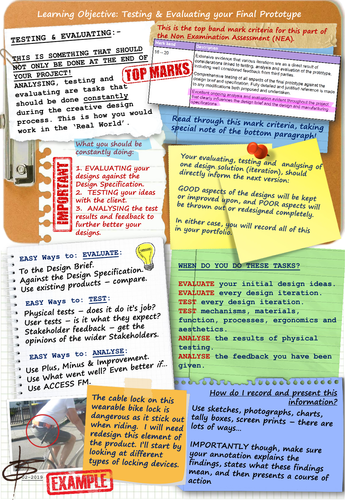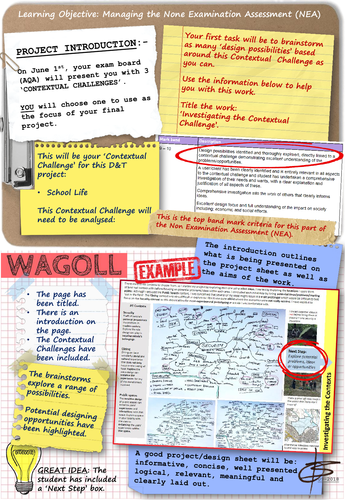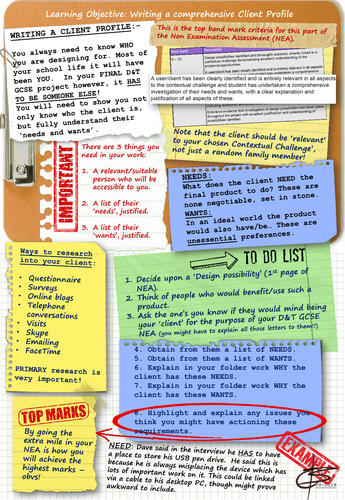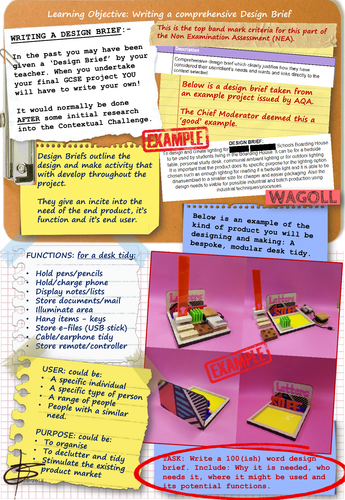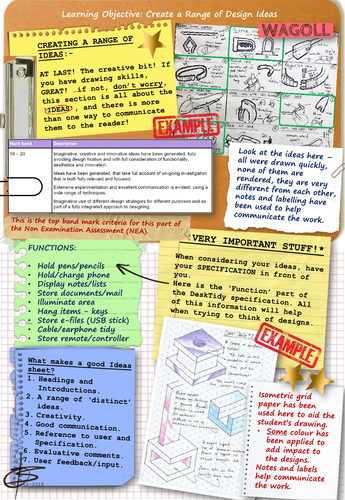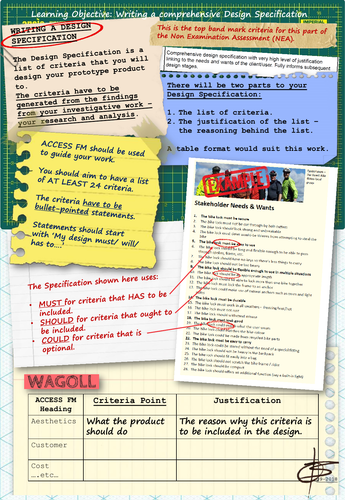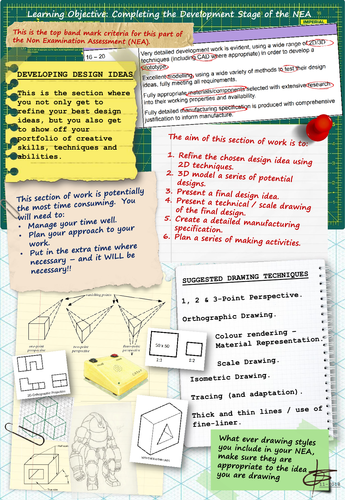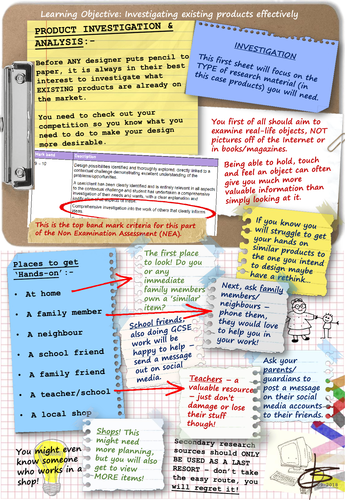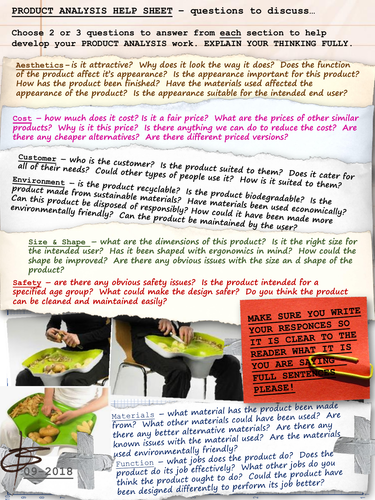
20Uploads
8k+Views
2k+Downloads
All resources

How to Test and Evaluate Your Prototype
A resource I have put together to help students with this part of the NEA. (Suits all specifications).
The resource looks at the expectations of the GCSE specification regarding testing the prototype, how to evaluate against the Design Specification as well as how t achieve the high band marks.

How to Analyse the Contextual Challenge
A resource I have put together to help students with this part of the NEA. (Suits AQA & OCR specifications)

How to Create a Useful Client Profile
A resource I have put together to help students with this part of the NEA. (Suits all specifications).
This resource looks at the information needed in a Client Profile, how to gather the information and present it in a logical and clear

How to Write an Informative Design Brief
A resource I have put together to help students with this part of the NEA. (Suits all specifications).
The resource identifies what makes a good Design Brief, includes an example and how the work meets the demands of the GCSE

How to Create and Present Design Ideas
A resource I have put together to help students with this part of the NEA. (Suits all specifications).
The resource gives advice on the drawing techniques to showcase, the expectations regarding labeling and annotation, and examples of good

How to Write a Justified Design Specification
A resource I have put together to help students with this part of the NEA. (Suits all specifications).
The Design Specification is a key piece of work that directly impacts the success of the project, from the research needed to create one, through to the final Evaluation. This resource covers what makes an effective and informative Design Specification, and gives practical tips on how to create

How to Produce and Present Development Work
A resource I have put together to help students with this part of the NEA. (Suits all specifications).
This resource provides information about the expectations of this part of the project, arguably the most difficult and time consuming. Examples of good practice are given and details of reaching the higher bands of the mark

How to Investigate and Analyse Effectively
A resource I have put together to help students with this part of the NEA. (Suits all specifications).
The quality and usefulness of the Research gathered during the project can make the difference between a successful GCSE project and A mediocre one. This resource gives help on the collection of, and the analysis of appropriate research

Analysing Your Research - Questions to Answer
A resource I have put together to help students with this part of the NEA. (Suits all specifications).
Students are good at analysing existing products when they have specific questions to answer. This resource provides many questions following the ACCESS FM format that will enable them.to work independently and

D&T New Specification NEA - Analysis of Context & Research
Having taught the new specification D&T course twice now, I have created a thorough, but easy to follow design folder. It has been graded at a high 8 and presents a resource that represents a realistic and achievable piece of course work.
The full folder consists of 36 A4 pages and has been chunked down for TES, and can be chunked down further for use in the classroom.
A lot of work has gone into this resource (I did the entire course work, practical too, along side my GCSE class so I could share with them my experiences of their course), which is why I ask the price of £10 for the full folder, and the cost of a pint for the individual sections.
I will be using this resource myself over the coming years, drip feeding each section to the class, using the slides as examples of good practice.
I hope you will find it as useful as I have, cheers, Oz.

New Specification D&T Folder - Manufacturing Specification & Record of Making
Having taught the new specification D&T course twice now, I have created a thorough, but easy to follow design folder. It has been graded at a high 8 and presents a resource that represents a realistic and achievable piece of course work.
The full folder consists of 36 A4 pages and has been chunked down for TES, and can be chunked down further for use in the classroom.
A lot of work has gone into this resource (I did the entire course work, practical too, along side my GCSE class so I could share with them my experiences of their course), which is why I ask the price of £10 for the full folder, and the cost of a pint for the individual sections.
I will be using this resource myself over the coming years, drip feeding each section to the class, using the slides as examples of good practice.
I hope you will find it as useful as I have, cheers, Oz.

New Specification D&T Folder - Testing & Evaluating
Having taught the new specification D&T course twice now, I have created a thorough, but easy to follow design folder. It has been graded at a high 8 and presents a resource that represents a realistic and achievable piece of course work.
The full folder consists of 36 A4 pages and has been chunked down for TES, and can be chunked down further for use in the classroom.
A lot of work has gone into this resource (I did the entire course work, practical too, along side my GCSE class so I could share with them my experiences of their course), which is why I ask the price of £10 for the full folder, and the cost of a pint for the individual sections.
I will be using this resource myself over the coming years, drip feeding each section to the class, using the slides as examples of good practice.
I hope you will find it as useful as I have, cheers, Oz.

Yr 7 or 8 Graphic Product - The Chocolate Box - Teacher Presentation
A series of 14, one hour lessons with a paper and boards/ Graphic Products focus. The learning objectives are centred around the D&T GCSE content listed in the specification for the KS4 option, written for the early years of KS3 teaching.
Lessons have starter questions and activities, resources needed to teach the lessons and home work/learning tasks where appropriate. Some lessons have extension tasks.
There are two DIT and Assessment lessons with the assessment lessons having the questions and answers provided.
The resource is fully editable in a M/S PowerPoint file.
There is an accompanying Student Resource booklet available, again in a completely editable landscape, PowerPoint file.

Yr 7 or 8 Graphic Product - The Chocolate Box - Student Workbook
A series of 15 A4 slides that accompany the ‘Yr 7 or 8 Graphic Products - Chocolate Box’ teaching resources.
Slide 1 is a contents page/ project overview sheet for the students, the following slides are for the 14 lessons in the scheme of work.
Key words have been listed on the contents page and there is a separate sheet for the students to record a glossary of terms as they are encountered throughout the project.
The resource can be printed in full colour or black and white, or used as a resource to show the students how to best present their work.
The PowerPoint format has been created in portrait orientation and is fully editable.

Yr9-10 Band Promotion Project
This project is suited to Yrs9-10. It is a complete resource for 16 weeks of classroom tasks (94 slides in all) . All supporting resources are included as separate files. The resource is completely editable, and is a good ‘pre-GCSE Final Project’ scheme for the students to get their teeth into.
The project is based around the promotion of a band/group/artist of the student choosing. The practical outcomes are a concert ticket/VIP pass, a 7" vinyl record sleeve, a promotional T-Shirt, keyring and gift bag - all based around a re-imagined brand identity designed by the students.
The SoW is run as though it is one continuous project, starting with the analysis of the Contextual Challenge, moving into research (the main theory section), creating a Design Specification that leads into the creative work. The creative work is punctuated with practical tasks, from CAD (2D Design and Photopea), to hand skills using mainly paper and boards.
Key skills have been built into the project, investigative, evaluative, analytical, communication and planning - all in way that the students would be expected to demonstrate in their final GCSE portfolios.
The project has been intentionally designed with limited budgets in mind. Paper and board are the main materials used, with the options of creating small acrylic keyrings, and printed T-shirts (if the students are able to provide the garment themselves).
I have run this project through twice, and I feel this latest version contains everything needed for a full terms work at KS4 at 2 to 3 lessons a week.

New Specification D&T Folder - Ideas & Development
Having taught the new specification D&T course twice now, I have created a thorough, but easy to follow design folder. It has been graded at a high 8 and presents a resource that represents a realistic and achievable piece of course work.
The full folder consists of 36 A4 pages and has been chunked down for TES, and can be chunked down further for use in the classroom.
A lot of work has gone into this resource (I did the entire course work, practical too, along side my GCSE class so I could share with them my experiences of their course), which is why I ask the price of £5 for the full folder, and the cost of a pint for the individual sections.
I will be using this resource myself over the coming years, drip feeding each section to the class, using the slides as examples of good practice.
I hope you will find it as useful as I have, cheers, Oz.
Bundle

New Specification D&T NEA Guidance Resources
All of the resources needed to help guide students through the new D&T specification.
Used throughout Year 10 during the teaching of mock NEA projects. Yr11 students are able to use these resources independently. I made them available electronically and had them printed off for their books. They also make attractive and informative classroom displays too… well, I think they

D&T New Specification Example NEA Folder
Having taught the new specification D&T course twice now, I have created a thorough, but easy to follow design folder. It has been graded at a high 8 and presents a resource that represents a realistic and achievable piece of course work.
The full folder consists of 36 A4 pages and has been chunked down for TES, and can be chunked down further for use in the classroom.
A lot of work has gone into this resource (I did the entire course work, practical too, along side my GCSE class so I could share with them my experiences of their course), which is why I ask the price of £10 for the full folder, and the cost of a pint for the individual sections.
I will be using this resource myself over the coming years, drip feeding each section to the class, using the slides as examples of good practice.
I hope you will find it as useful as I have, cheers, Oz.

The Lamp Project
Having had a lot of interest on social media, I have decided to make available (for the cost of 1 English pint of beer!) the PowerPoint that I use to help teach the scheme.
The PowerPoint covers 16 1 hour lessons, including 2 assessments, one written (included with answer sheet, and one Socrative, again, the link and SOC code are included). The making will take longer than first thought, though as the resource is completely editable can be adapted for all needs and expectations.
Each lesson is just one A4 portrait slide - when in presentation mode, press the + and - buttons to zoom into an area and back out again - forgive me if I’m teaching ‘grandma to suck eggs’!
I hope this save you a lot of prep time, and for the cost of a beer I think it is well worth it!
Cheers! Oz Bennett

Yr7 Mechanisms Project - Mechanical Grabber - Resistant Materials
A Yr7 project that has been developed so that it can be delivered by non-specialists as well as specialist D&T teachers.
The resource has an animated teacher presentation with an accompanying comprehensive student work book.
The project practical outcome is a mechanical grabbing device that uses 3mm plywood levers and 6mm MDF handles and jaws, assembled using lock nuts, bolts and PVA glue - all instructions are illustrated in both attached resources.
The project spans 14 one hour lessons, though can be lengthened or shortened as both resources are editable MS PowerPoints.
Lessons have retrieval practice question starters, and there are extended learning tasks every two lessons (these are detachable sheets from the back of the workbook). Maths and reading comprehension tasks are also included. Lesson 6 has been allocated as a DIT lesson.
Topics covered include: Designers and their designs, biomimicry, workshop safety, timbers, workshop tools and equipment, simple machines with a focus on levers, stock forms of timber, the design process, scaling drawings, workshop practical , testing and evaluating. Lesson 14 has a 20 mark assessment which again can be extended if needed.
The lesson sequence is as follows:
L1 - What is a Design Brief
L1&2 - How Do We Make a Mechanism?
L3&4 - What Are Levers & Simple Machines?
L5 - Which Material and Tools?
L6 - DIT - Dedicated Improvement Time
L7 - How Does Research & Analysis Help Designing?
L8 - What Does Developing A Design Mean?
L9 - Creating and Using Templates
L10&11 - How Do We Shape MDF?
L11&12 - Decorating & Assembling
L13 - Testing & Evaluating.
L14 - Assessment.
I have used this for two years now making changes as I have taught it. I feel that this project format works extremely well. Where I have had split groups with non-specialists, they have taught the workbook/theory side of things, and I have done the practical aspects.
Prep info: the plywood is precut to 200mm lengths at 25mm wide. The MDF is supplied to the students as two times 100mmx100mm pieces (though this is generous!). Jigs were made for the drilling of the holes for the bolts to assure accuracy and uniformity.

